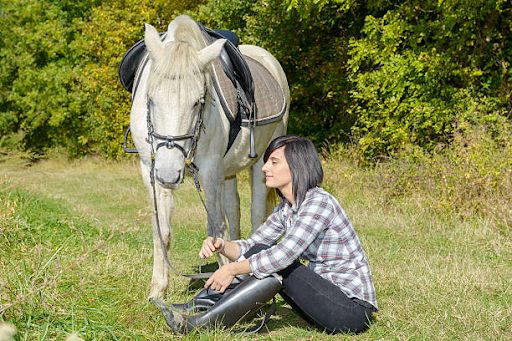Addiction recovery is often seen as a long and challenging journey, but there are alternative therapies that can make the process more manageable and even transformative. One of these is horse therapy recovery, also known as equine-assisted therapy. Horses have been used for therapeutic purposes for centuries, and in recent years, their role in addiction recovery has gained recognition for its effectiveness. This unique form of therapy offers emotional healing, personal growth, and a sense of connection that is crucial for those battling addiction.
In this blog, we’ll explore how horse therapy recovery works, why it is such a powerful tool for overcoming addiction, and how it complements more traditional treatment methods.
What Is Horse Therapy in Addiction Recovery?
Horse therapy recovery, or equine-assisted therapy, involves working with horses under the guidance of a trained therapist. Unlike traditional therapy, which often takes place in an office setting, horse therapy occurs outdoors, in a natural environment. This experiential form of therapy focuses on building a relationship with the horse through activities like grooming, feeding, and leading the horse.
The core idea behind horse therapy recovery is that horses, being highly sensitive animals, can mirror the emotions of the person working with them. They respond to body language, tone, and energy, providing immediate feedback that helps individuals become more aware of their emotional state. This type of therapy promotes emotional growth, teaches healthy coping mechanisms, and aids in building trust—elements that are vital for anyone recovering from addiction.
How Does Horse Therapy Help in Addiction Recovery?
Addiction often stems from unresolved emotional pain, trauma, or feelings of isolation. Overcoming addiction involves not just detoxifying the body but also addressing these underlying emotional and psychological issues. Horse therapy recovery offers several benefits that support this deeper healing process:
- Emotional Regulation and Awareness
Addiction can create emotional chaos, making it difficult for individuals to recognize or regulate their feelings. Horses are sensitive to human emotions and can sense when someone is anxious, stressed, or calm. When someone in recovery interacts with a horse, the horse’s responses can help the individual become more aware of their emotional state.
For example, if a person approaches a horse with nervous energy, the horse might become restless or anxious, reflecting that emotion back to the person. This real-time feedback encourages individuals to recognize and regulate their emotions. Over time, these skills can translate into better emotional control in daily life, helping to prevent relapse.
- Building Trust and Accountability
Addiction often destroys trust—both in oneself and in others. In recovery, rebuilding trust is crucial, but it can be a difficult process. Horses, being large and powerful animals, require individuals to be patient, consistent, and trustworthy. A horse won’t simply follow instructions unless it feels safe and trusts the person leading it.
Through consistent interaction, individuals in horse therapy recovery learn to build a bond of trust with the horse. This process fosters accountability, as the individual must show up consistently, both physically and emotionally, to maintain that bond. This can help people in recovery rebuild their self-esteem and learn to trust themselves and others again.
- Reducing Stress and Anxiety
The early stages of addiction recovery are often accompanied by high levels of stress and anxiety. The body and mind are adjusting to a new reality without substances, which can feel overwhelming. Spending time with horses in a peaceful, natural environment has a calming effect on many people.
Research has shown that interacting with animals, especially horses, can lower cortisol levels, the hormone responsible for stress. The rhythmic motion of grooming a horse or the simple act of being in the presence of such a gentle creature can help reduce anxiety and promote a sense of peace and relaxation. This calming effect is essential for individuals in recovery, providing a much-needed respite from the emotional turbulence that often accompanies early sobriety.
- Encouraging Mindfulness and Presence
Mindfulness, the practice of being fully present in the moment, is a key component of successful addiction recovery. Horses demand attention and presence. If someone is distracted, anxious, or mentally elsewhere, the horse will sense it and may become uncooperative. This forces individuals to focus on the present moment, which is a core principle of mindfulness.
Engaging in activities like grooming, feeding, or leading a horse helps individuals practice mindfulness in a natural way. This skill can then be applied to other areas of life, helping those in recovery manage cravings, reduce stress, and focus on the positive aspects of their new, sober life.
- Healing from Trauma
Many people struggling with addiction have experienced trauma in their lives. Whether it’s childhood abuse, neglect, or a traumatic event in adulthood, unresolved trauma can lead to substance abuse as a form of self-medication. Horses offer a unique form of non-verbal therapy that can help individuals heal from trauma.
The bond formed with a horse in horse therapy recovery can provide a sense of safety and unconditional acceptance that may be hard to find in human relationships. Horses don’t judge; they respond to what’s happening in the moment, offering a pure and non-judgmental connection. For those who have difficulty trusting others due to past trauma, this can be an incredibly healing experience.
How Horse Therapy Complements Traditional Addiction Treatment
While horse therapy recovery offers many unique benefits, it’s typically used as a complementary therapy to traditional addiction treatment methods. It can work alongside more conventional approaches like counseling, group therapy, and medication-assisted treatment to provide a well-rounded recovery experience.
For instance, while traditional therapy focuses on talking through emotions and challenges, horse therapy recovery provides a more hands-on, experiential approach. The combination of these therapies can help individuals gain a deeper understanding of themselves and their emotions, offering them more tools to use in their recovery journey.
Moreover, many rehab centers and addiction treatment programs now offer horse therapy recovery as part of a holistic approach to healing. This allows individuals to explore different types of therapy and find what resonates with them the most.
Is Horse Therapy Right for You?
Horse therapy recovery isn’t for everyone, but it can be an excellent option for individuals who feel disconnected from traditional therapy methods or who are looking for a more holistic approach to recovery. The non-verbal nature of equine therapy, combined with the emotional feedback provided by horses, can offer a fresh perspective on healing for those struggling with addiction.
This type of therapy is particularly effective for individuals who:
Struggle with emotional regulation or awareness
Have difficulty trusting others or building relationships
Experience high levels of stress and anxiety during recovery
Are healing from trauma or past abuse
If you’re interested in exploring horse therapy recovery, speak to your mental health professional or addiction counselor to find out if there are equine therapy programs available in your area.
FAQs About Horse Therapy for Addiction Recovery
- What is horse therapy recovery?
Horse therapy recovery, also known as equine-assisted therapy, involves working with horses to promote emotional healing and personal growth. It’s often used as part of addiction recovery programs to help individuals manage stress, build trust, and develop emotional regulation skills.
- How does horse therapy help with addiction recovery?
Horse therapy helps individuals in addiction recovery by promoting emotional awareness, reducing stress and anxiety, and building trust. Horses mirror human emotions, offering real-time feedback that helps individuals better understand and manage their feelings.
- Do I need to know how to ride a horse for horse therapy recovery?
No, horse therapy recovery doesn’t involve riding horses. Instead, the therapy focuses on interacting with horses through activities like grooming, feeding, and leading them. These activities help individuals develop emotional regulation, mindfulness, and trust.
- Is horse therapy a replacement for traditional addiction treatment?
Horse therapy is typically used as a complementary therapy alongside traditional addiction treatment methods like counseling and group therapy. It provides a hands-on, experiential approach that can enhance the effectiveness of traditional treatments.
- How can I find horse therapy programs for addiction recovery?
Many rehab centers and addiction treatment programs offer horse therapy as part of their holistic approach to recovery. Speak with your counselor or treatment provider to find out if there are equine-assisted therapy options available in your area.
Horse therapy recovery offers a unique and transformative way to support addiction recovery. By fostering emotional regulation, trust-building, and mindfulness, this powerful therapy can help individuals not only overcome addiction but also grow emotionally and mentally in ways that traditional therapies may not always provide. If you’re seeking a holistic approach to addiction recovery, horse therapy could be the key to unlocking a deeper level of healing.


